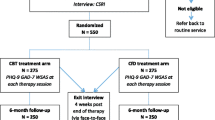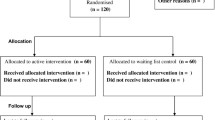Abstract
Purpose
Patients differ in their response to treatments. There is obvious clinical utility in establishing patient characteristics that are associated with differential treatment responses (i.e. are effect modifiers or moderators of treatment response). Factors that moderate response to cognitive behavioural therapy (CBT) remain unclear. This study investigates whether factors prognostic of general depression outcome generally are also moderators of response to online CBT in a sample of depressed patients recruited through UK general practices.
Methods
Secondary analysis of a randomised controlled trial, internet-based psychotherapy for depression. A total of 297 patients referred from 55 UK general practices and suffering from depression were randomly allocated to receive either online CBT or waiting list control. Treatment effect was measured by comparing depression score at 4 months between randomization groups. Treatment effect modification was assessed using regression analyses focusing on interactions between treatment effect and putative moderator variables.
Results
Pretreatment severity and marital status moderated treatment response. More severe patients, and patients who were separated, widowed, or divorced, benefited most from the intervention. Weak evidence suggested that treatment effectiveness diminished with increasing recent adverse life events. No evidence was found to suggest that educational attainment, age, and history of depression-moderated treatment response.
Conclusions
Secondary analyses of trials comparing two or more treatments allow factors that may moderate treatment response to be distinguished from more general prognostic indicators, although caution is needed in interpreting such exploratory analyses.
Similar content being viewed by others
References
Churchill R, Hunot V, Corney RKM, McGuire H, Tylee A, Wessely S (2001) A systematic review of controlled trials of the effectiveness and cost-effectiveness of brief psychological treatments for depression. Health Technol Assess 5:1–173
Proudfoot J, Goldberg D, Mann A, Everitt B, Marks I, Gray JA (2003) Computerized, interactive, multimedia cognitive-behavioural program for anxiety and depression in general practice. Psychol Med 33:217–227
Kessler D, Lewis G, Kaur S, Wiles N, King M, Weich S, Sharp DJ, Araya R, Hollinghurst S, Peters TJ (2009) Therapist-delivered internet psychotherapy for depression in primary care: a randomised controlled trial. Lancet 374:628–634
Kraemer HC, Wilson GT, Fairburn CG, Agras WS (2002) Mediators and moderators of treatment effects in randomized clinical trials. Arch Gen Psychiatry 59:877–883
Fournier JC, DeRubeis RJ, Shelton RC, Hollon SD, Amsterdam JD, Gallop R (2009) Prediction of response to medication and cognitive therapy in the treatment of moderate to severe depression. J Consult Clin Psychol 77:775–787
Wierzbicki M, Pekarik G (1993) A metaanalysis of psychotherapy dropout. Prof Psychol Res Pract 24:190–195
Brookes ST, Whitley E, Peters TJ, Mulheran PA, Egger M, Davey Smith G (2001) Subgroup analyses in randomised controlled trials: quantifying the risks of false-positives and false-negatives. Health Technol Assess 5:1–56
Sotsky SM, Glass DR, Shea MT, Pilkonis PA, Collins JF, Elkin I, Watkins JT, Imber SD, Leber WR, Moyer J et al (1991) Patient predictors of response to psychotherapy and pharmacotherapy—findings in the Nimh treatment of depression collaborative research-program. Am J Psychiatry 148:997–1008
Elkin I, Gibbons RD, Shea MT, Sotsky SM, Watkins JT, Pilkonis PA, Hedeker D (1995) Initial severity and differential treatment outcome in the national institute of mental-health treatment of depression collaborative research-program. J Consult Clin Psychol 63:841–847
Trusheim MR, Berndt ER, Douglas FL (2007) Stratified medicine: strategic and economic implications of combining drugs and clinical biomarkers. Nat Rev Drug Discov 6:287–293
Jarrett RB, Eaves GG, Grannemann BD, Rush AJ (1991) Clinical, cognitive, and demographic-predictors of response to cognitive therapy for depression—a preliminary-report. Psychiatry Res 37:245–260
Thase ME, Simons AD, Mcgeary J, Cahalane JF, Hughes C, Harden T, Friedman E (1992) Relapse after cognitive behavior-therapy of depression—potential implications for longer courses of treatment. Am J Psychiatry 149:1046–1052
Lewinsohn PM, Allen NB, Seeley JR, Gotlib IH (1999) First onset versus recurrence of depression: differential processes of psychosocial risk. J Abnorm Psychol 108:483–489
Safran JD, Segal ZV, Vallis TM, Shaw BF, Samstag LW (1993) Assessing patient suitability for short-term cognitive therapy with an interpersonal focus. Cogn Ther Res 17:23–38
Beck AT, Steer RA (1987) Manual for the revised beck depression inventory. The Psychological Corporation, San Antonio, TX
World Health Organization (1992) International statistical classification of diseases and health related problems. The ICD-10, 2nd edn (WHO, Geneva)
Lewis G, Pelosi AJ, Araya R, Dunn G (1992) Measuring psychiatric-disorder in the community—a standardized assessment for use by lay interviewers. Psychol Med 22:465–486
Holmes TH, Rahe RH (1967) Social readjustment rating scale. J Psychosom Res 11:213–218
Elkin I, Shea MT, Watkins JT, Imber SD, Sotsky SM, Collins JF, Glass DR, Pilkonis PA, Leber WR, Docherty JP et al (1989) National-Institute-of-Mental-Health Treatment of Depression Collaborative Research-Program—general effectiveness of treatments. Arch Gen Psychiatry 46:971–982
Ma SH, Teasdale JD (2004) Mindfulness-based cognitive therapy for depression: replication and exploration of differential relapse prevention effects. J Consult Clin Psychol 72:31–40
Hyde J, Calnan M, Prior L, Lewis G, Kessler D, Sharp D (2005) A qualitative study exploring how GPs decide to prescribe antidepressants. Br J Gen Pract 55:755–762
Dohrenwend BS, Krasnoff L, Askenasy AR, Dohrenwend BP (1978) Exemplification of a method for scaling life events—peri life events scale. J Health Soc Behav 19:205–229
National Institute for Health and Clinical Excellence (2009) Depression: the treatment and management of depression in adults. CG90. National Institute for Health and Clinical Excellence, London
Acknowledgments
This work was initiated as part of a MEd in the Psychology of Education, at the Graduate School of Education, University of Bristol, UK, supervised by Dr Sarah Meadows. The authors wish to thank Michael King, Scott Weich, and the rest of the IPCRESS team. The IPCRESS study was funded by the BUPA Foundation, and supported by the UKCRN Mental Health Research Network.
Conflict of interest
None.
Author information
Authors and Affiliations
Corresponding author
Rights and permissions
About this article
Cite this article
Button, K.S., Wiles, N.J., Lewis, G. et al. Factors associated with differential response to online cognitive behavioural therapy. Soc Psychiatry Psychiatr Epidemiol 47, 827–833 (2012). https://doi.org/10.1007/s00127-011-0389-1
Received:
Accepted:
Published:
Issue Date:
DOI: https://doi.org/10.1007/s00127-011-0389-1




